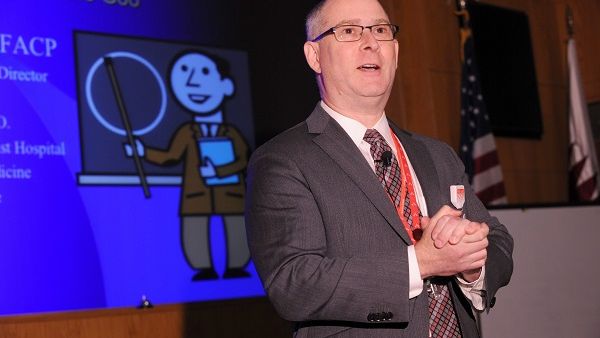WCM-Q Grand Rounds Discusses Optimization of Clinical Teaching

Methods for optimizing clinical teaching for medical students were discussed at the latest Weill Cornell Medicine-Qatar (WCM-Q) Grand Rounds.
Dr. Todd Simon, Designated Institutional Officer at NewYork Presbyterian Brooklyn Methodist Hospital, led a discussion that explored key traits of good teachers, different categories of learners, and the principles of adult learning theory.
Dr. Simon also emphasized the importance for faculty to continually reflect upon their teaching methods and classroom experiences, and to seek out and emulate accomplished teachers and best teaching practices
Speaking at WCM-Q to an audience of physicians, pharmacists, nurses and allied health professionals, Dr. Simon said: “Emulating good teachers and their practices is a very effective way to optimize learning outcomes. Most effective clinical teachers have an organized, planned approach, systematic teaching practices, are very good at summarizing information, and demonstrate a high degree of knowledge and competence. Not only this, but the best teachers are also respectful, friendly, and are enthusiastic about their subject and about teaching. That enthusiasm is very stimulating and engaging for students.”
Dr. Simon then explained that learners in clinical medicine settings can be categorized into four groups: reporters, who are adept at gathering data by taking a patient’s history and conducting a physical exam; interpreters who are good at assimilating that data and developing a differential diagnosis; managers, who can gather data, interpret it and also develop diagnostic and treatment plans; and educators, who can do all of the above and also teach the concept to other learners.
Dr. Simon added: “Once you have categorized your learner you can most effectively help them to progress by teaching to their level.”
The lecture, titled Teaching Medicine: Adding Struts to the Goo, was accredited locally by the Qatar Council for Healthcare Practitioners-Accreditation Department (QCHP-AD) and internationally by the Accreditation Council for Continuing Medical Education (ACCME).
Background Information
Weill Cornell Medical College in Qatar
Weill Cornell Medicine - Qatar is a partnership between Cornell University and Qatar Foundation. It offers a comprehensive six-year medical program leading to the Cornell University M.D. degree with teaching by Cornell and Weill Cornell faculty and by physicians at Hamad Medical Corporation (HMC), Aspetar Orthopedic and Sports Medicine Hospital, the Primary Health Care Corporation, the Feto Maternal Center, and Sidra Medicine, who hold Weill Cornell appointments. Through its biomedical research program, WCM-Q is building a sustainable research community in Qatar while advancing basic science and clinical research. Through its medical college, WCM-Q seeks to provide the finest education possible for medical students, to improve health care both now and for future generations, and to provide high quality health care to the Qatari population.






